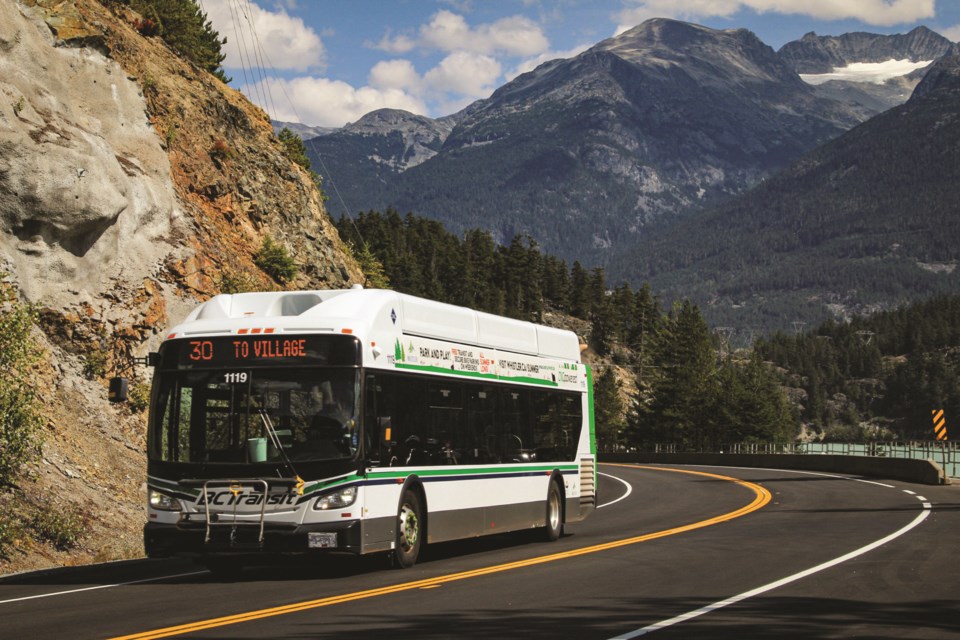On the heels of the longest transit strike in B.C. history, Whistler officials are pushing for a so-called "non-performance clause" to be added to its new annual operating agreement (AOA) with BC Transit in the event of a future job action.
According to a report presented at the July 19 council meeting, Resort Municipality of Whistler (RMOW) staff have met with corridor partners in Squamish and Pemberton as well as BC Transit, and have formally requested wording for the clause be added to the AOA. The clause's intent would be to protect BC Transit and local municipal partners from shouldering ongoing costs while transit service is suspended.
During the more than four-month transit strike that finally ended in June, the RMOW continued to pay lease fees on the Whistler transit facility, and while the municipality saved money by not running buses in that period, it of course also missed out on farebox and pass revenue. The RMOW and BC Transit split operational transit costs, with the Crown corporation covering 47 per cent and the municipality responsible for the other 53 per cent. The RMOW takes in 100 per cent of fare revenue.
BC Transit has indicated it would work with its local government partners in the Sea to Sky to incorporate new language into next year's 2023-24 AOA.
In May, in the midst of the transit strike, Whistler Councillor Ralph Forsyth expressed his frustration that the RMOW's hands were tied in an opaque bargaining process between BC Transit’s subcontractor and the union representing local transit workers.
“Good contracts make good friends and we need something that allows us to exert some control over an operation that exists in our community,” he said at the May 10 council meeting.
“No one seems to care except us and no one is coming to any resolution—but we’re getting the blame.”
The 2022-23 AOA details the projected budget for the transit system and defines hours of operation, revenues, costs, leasing payments, and BC Transit’s financial contribution for the defined term.
The AOA is typically brought before council in December. However, due to the 137-day transit strike, the RMOW was given an extension.
Since transit resumed last month, the return of ridership has been increasing slowly but remains below 2019 levels, according to the RMOW. With the introduction of free transit through Labour Day and discounted passes until Nov. 1, the hope is that ridership will increase and surpass 2019 levels, the municipality said.
This year's AOA includes a 2.5-per-cent increase related to labour costs. However, the actual costs of the job action settlement will not flow through to the RMOW until the 2023-2024 AOA.
The new five-year collective agreement, retroactive to April 2020, includes annual wage increases of 1.5, two, three, three, and four per cent, for a total 13.5-per-cent increase over the term, plus a two-per-cent signing bonus for 2022.
In September, Whistler council moved forward with a request to BC Transit to increase bus service by 5,000 hours. However, the province decided not to move forward with transit expansions throughout the province, which meant the AOA hours of service had not changed.
“When BC transit learned that there was going to be no expansion funding in the provincial budget around the province, they initiated transit system optimization and basically, what they did is they reviewed the ridership for all the systems around the province. They looked at opportunities to take from under-performing routes and to move those hours into places where they could perform better,” said RMOW transportation demand management planner Emma DalSanto.
Crompton was disappointed the province did not approve the transit hour expansion and hopes Victoria will consider the increase going forward for next year's AOA.
"I remain disappointed that the province decided against funding their half of our proposed transit expansion. I hope they'll join us in future investments in transit moving forward. I also hope the province will find a way to see their savings from the transit stoppage put back into this service," he said.
The cost of this year's AOA is $12,682,270, of which the RMOW share is $7,500,000. This year's AOA is an increase of $856,139 from 2021-2022. This works out to 31 buses and approximately 75,000 transit hours.
-With files from Brandon Barrett




